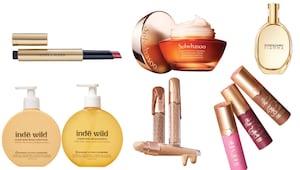The Benefits of Coconut Oil for Your Face, According to a Dermatologist
We got the final answer, straight from dermatologists.

Once upon a time, my friend accidentally knocked over a fragile glass vial of my very favorite, very pricey face serum, causing it to shatter on the tile floor. I cried (not really) (but really) as I picked up the shards of glass and wiped up the mess. I was thisclose to forgiving her when she had the audacity to say, "You don't need all those skincare products anyway—all you really need is coconut oil."
Um, what?! I thought. How dare she?! But my rage quickly turned to curiosity. Could she...be...right? Is coconut oil actually the miracle beauty ingredient I've been needing all this time, and have just been avoiding it out of fear of breakouts and oil slicks?
I mean, sure—people have been talking about coconut oil like it's magic for ages. Bad breath, underarm B.O., dry hair—coconut oil supposedly cures it all. But it couldn't possibly be the skincare miracle worker it's touted to be, right? Right!?
Skeptical, I reached out to dermatologist Joshua Zeichner, M.D. director of cosmetic & clinical research in dermatology at Mount Sinai Hospital in NYC, to find out what's true and what's just beauty BS. Keep reading to find out what you should know before slathering coconut oil all over your face.
What Are the Skincare Benefits of Coconut Oil?
Though coconut oil is usually praised for being a great, hydrating moisturizer, thanks to its fatty acid content, here's the crazy truth: Coconut oil is actually too thick to soak into your pores and sufficiently hydrate your skin. In fact, all facial oils kinda suck at moisturizing (what! Yeah, it's true).
Technically, they're best when used as a final step in your skincare routine to lock in all the hydration and the products applied before it (kind of like a seal), rather than as a moisturizer themselves. And coconut oil is no different, says Dr. Zeichner. So if you're planning to slather on a layer of oil and call it a day, you might actually be drying out your skin in your quest to hydrate it.
Still, if you're really amped up about dipping your face in coconut oil, make sure to apply it over a layer of moisturizer to make it effective. Or, tiptoe into the trend by using it as a makeup remover or cleanser since, you know, oil dissolves oil, says Dr. Zeichner.
Of course, there's one caveat to the whole coconut-oil thing: breakouts. Some people swear coconut oil is the ultimate DIY treatment for acne, while others promise it'll break you out as soon as it touches your skin. Which brings us to...
Does Coconut Oil Help With Acne Breakouts?
The internet is a fun place where you can find arguments to support literally any idea (flat Earth conspiracy, anyone?), which is why it can be difficult to figure out the truth about coconut oil and breakouts. So here are the facts, straight from an actual doctor:
"Coconut oil may be useful in treating acne-prone skin, because it has high levels of skin-soothing linoleic acid—something that's deficient in the skin of people with acne," says Dr. Zeichner. "It also contain's lauric acid, which is thought to be antimicrobial, so it may lower levels of acne-causing bacteria on the skin and reduce inflammation."
That being said, some people with acneic or oily skin still find coconut oil too heavy and comedogenic (pore-clogging) for their face. "Everyone is different," says Dr. Zeichner. "If you prefer a natural face oil, you can certainly try coconut oil on your skin, but if it ends up breaking you out, you'll know it's too heavy for you."
In short, it might help, or it might make things worse. I know, I know—life's not fair. And if that answer isn't clear enough for you, stick to the acne ingredients and treatments that have been thoroughly studied and proven to work, like salicylic acid and benzoyl peroxide.
Overall, Is It Okay to Use Coconut Oil on Your Skin?
Unless you consider possible breakouts "harmful," coconut oil is pretty harmless to try, according to Dr. Zeichner. But is it the magical, wonderful, multipurpose skincare ingredient it's touted to be? Eh, probably not, or the entire world would be happily using it, and the shelves of Sephora would be stocked with it.
As a cleanser and makeup remover, yes, it works (but can also leave a residue behind that might clog pores), and as a last-step facial oil, sure, it'll lock in your moisture. But as far as being an acne treatment, what works for you might not work for me—and, realistically, probably won't work as well as other tried-and-true treatments out there.
Still, if you live life on the edge and are willing to give coconut oil a go, you're a brave, brave soul. As for me and my acne-prone face, though, we'll be sticking to the pricey serums and acne products that I know will, for a fact, work, TYVM.
more from Beauty

The Cosmo-approved holiday beauty list to help you glow through party season

The beauty drops currently living rent-free on our vanities

Everything you need to know about dark spots before you try to fade them

How the fragrance boom is changing the way we wear perfume every single day

Why 'Heated Rivalry' has everyone hot, bothered, and obsessed

Regal revivals, fashion shake-ups, and everything new we’re obsessing over this month

When is the new season of 'Euphoria' out? Plus 5 things we know about it

Why your best friend might be the most stable relationship you’ll ever have

I’m a romance writer—my husband and I lived out the sex scene I was writing

Why more people are turning to audio erotica for more intimate fantasies
